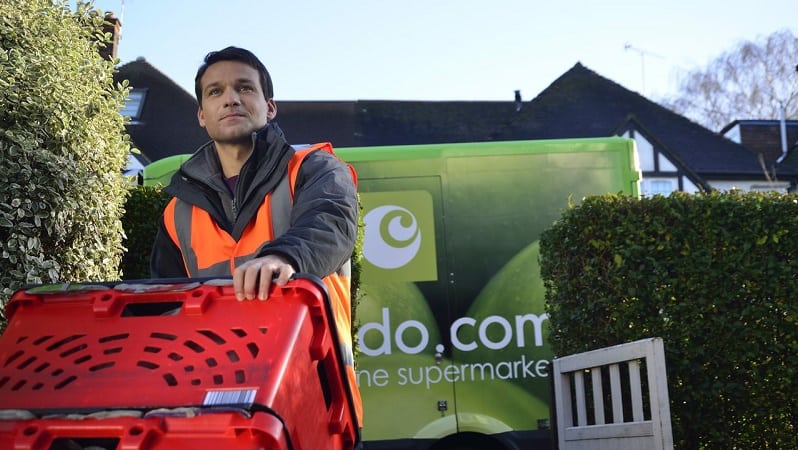Monday 15 January
- Trading updates from Rio Tinto and PageGroup
- Davos World Economic Forum (all week)
- Rightmove UK house price index
- Chinese 1- and 5-year interest rate decision
Tuesday 16 January
- Trading updates from Experian and QinetiQ
- German ZEW economic survey
- In the US, quarterly results from Morgan Stanley and Goldman Sachs
- Ocado Q4 trading update
Online grocer and delivery software Ocado will release its fourth quarter trading update this Tuesday in a fiscal year where shares have come out relatively unchanged, but are still three quarters below the 2021 peak.
Earliest forecasts for Ocado becoming profitable still sit two years away, and concerns of inflation reducing consumer base have also put a strain on the business.
AJ Bell investment director Russ Mould, head of financial analysis Danni Hewson, and investment analyst Dan Coatsworth said: “Ocado therefore joins the long list of firms that were seen as winners during the pandemic but have fallen from favour since the end of lockdowns, as growth rates have proved hard to sustain and rising interest rates have taken a toll on perceived growth stocks, especially those that offer jam-tomorrow but losses today.”
The update, which will not include December, will focus mainly on Ocado Retail, its 50-50 delivery partnership with Marks & Spencer. Ocado also made a deal this year with pharmaceutical distributor McKesson for its intelligent automation technology, a dive outside groceries.
“In this context, all of the focus will be on the fourth-quarter numbers, how they stack up relative to the guidance given for fiscal 2023 and whether there is any change to that guidance for the full-year to November from chief executive Tim Steiner and team,” Mould, Hewson, and Coatsworth said.
The current guidance includes revenue growth in mid-single digits, and slightly positive earnings before interest, taxes, depreciation and amortisation.
In terms of the fourth quarter, analysts will look at retail revenue, which was £549m for Q4 in the previous fiscal year. Basket size will also be an area of interest, which averaged £120.72 in Q3 of this year, compared to the pandemic peak of £147 and the pre-pandemic rate of £110.
“Some of this is down to inflation, however, and comments on the mix between price and volume will be of interest,” Mould, Hewson, and Coatsworth said. “In the third quarter, prices rose 8.4% year-on-year while unit volumes per basket fell 3.9% to 44.”
Wednesday 17 January
- Full-year results from Ramsdens
- First-half results from Frontier Developments
- Trading updates from Diploma, Galliford Try, 888 and Midwich
- UK inflation
- Chinese industrial production, retail sales and tangible fixed asset investment growth
- EU inflation
- US retail sales
- US industrial production
- US NAHB housebuilding industry survey
- Federal Reserve Beige Book on US economic conditions
- In the US, quarterly results from US Bancorp, Kinder Morgan, Citizens Financial and Alcoa
Thursday 18 January
- Trading updates from Sage, Flutter Entertainment, Kier, Currys, Bakkavor and N. Brown
- US weekly initial unemployment claims
- US oil inventories
- US new housing permits
- US new housing starts
- In Asia, quarterly results Taiwanese silicon chip foundry TSMC
- In the US, quarterly results from M&T Bank, American Airlines, Birkenstock and Bank OZK
Friday 19 January
- Trading updates from DFS Furniture and Petershill Partners
- UK retail sales
- US existing homes sales
- In the US, quarterly results from Travelers and Fifth Third Bancorp
- Burberry Q3 results
Burberry will produce its third quarter update on Friday after shares fell by over a third in the past year. The price marks a four-year low for the company.
“A weak recovery in the important Chinese market, broader concerns over luxury goods demand and so-called premiumisation strategies (and perhaps whether companies are starting to accidentally price the more aspirational customer out of the market) and a disappointing outlook statement alongside November’s interim results have all contributed to that share price slide,” Mould, Hewson, and Coatsworth said.
In May, half-year company targets included revenue growth in the high single digits and operating margins near 20% with a constant exchange rate basis. However, CEO Jonathan Aykeroyd adjusted these expectations in November, claiming a global slowdown in luxury demand.
For the year, analysts expect total sales of £3.1bn and an operating profit of £550m. This factors in a £110m decrease in sales and £60m decrease in profits due to currency movements. The company also completed its £400m share buyback during the quarter. Burberry paid over £200m in dividends during 2023, and expects to do the same in 2024.
“Analysts and investors will also look to compare momentum in the third quarter compared to that shown earlier in the year,” Mould, Hewson, and Coatsworth said.
“In the second quarter, comparable store sales rose 10% year-on-year in Europe, the Middle East and Africa, advanced by 2% in Asia and fell 10% in the Americas. Analysts will no doubt also look for a progress report across retail, wholesale and licensing, as well as additional colour on online versus physical sales, pricing and input costs.”










